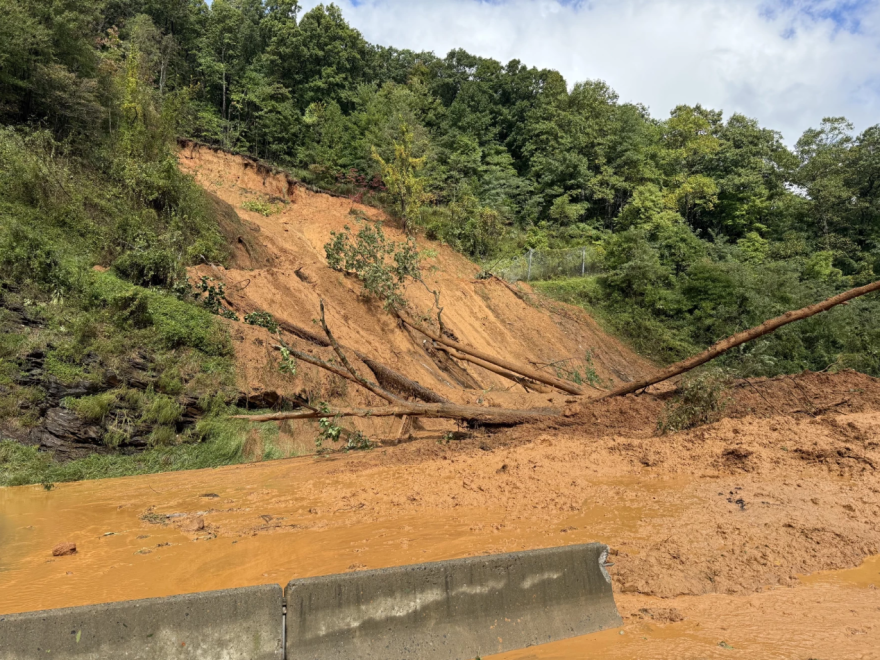Western North Carolina experienced more than 2,000 landslides during Hurricane Helene – and that massive geological shakeup leaves some areas more vulnerable to future landslide risk.
On Tuesday, county officials shared with the Buncombe County Board of Commissioners that they’re working with FEMA and North Carolina leaders to stabilize slopes. The work focuses on 55 of the county’s most complicated and dangerous slopes.
Buncombe has worked with the North Carolina Geological Survey to create a statewide database of landslides. Hazard mitigation is not physically or fiscally possible in all areas with high landslide risk.
While the county isn't on the hook for paying for repairs, they are helping create a process for addressing the most complicated slides, County Manager Avril Pinder said.
There is already a process for the more simple landslide repairs, county planner Burnett Walz shared in a presentation. In the case of landslides that impacted one private property or site, FEMA’s Hazard Mitigation program will finance repairs. And in the case of landslides on public property, the FEMA Public Assistance program will pay for repairs.
Two county properties, the General Services Department in downtown Asheville and the county landfill on Riverside Drive, are beginning the repair process already, along with 31 individual properties.
But for the dozens of landslides that are considered “large and complex” cases, spanning multiple properties, there’s no existing process for stabilizing the land against future landslide threats.
A large set of slides in the Grovemont neighborhood of Swannanoa will serve as the test case for how the federal, state and local government can work together on landslide mitigation. During Helene, the Grovemont slides killed two people, according to county spokesperson Lillian Govus.
The remnants of that Grovemont landslide — totaling 126,000 square yards — loom over the community and remain a threat to several households in the neighborhood, which is why the county is prioritizing that project, she added.

The process for landslide remediation is complicated – it includes multiple assessments and reimbursement cycles before any construction can begin. Right now, the county is securing a $1.3 million contract for an architectural and engineering study of the Grovemont site. Once that study is complete, the county hopes to proceed with remediating the slope, a project that was roughly estimated at $17 million, according to the Asheville Citizen-Times.
“The idea is that we're going to hopefully prove out that this test case will work and it's scalable and can be applied to not only other slides in Buncombe County but throughout all Western North Carolina,” Walz said.
When Commissioner Terri Wells asked for a timeline on the Grovemont project, Walz replied that he couldn’t “in any intelligent manner” provide one.
It all depends on how quickly the county can secure funding. As proposed, the state would cover 75% of the remediation costs and FEMA would cover the other 25%. Buncombe is also interested in installing an alert system in areas with elevated landslide risk, but Govus said it’s unclear how the county would acquire funding for that project.
Commissioner Al Whitesides expressed skepticism over whether the agencies would actually pay for the projects. “We’ll see,” he said.
Grow NC, the governor’s Helene recovery committee, recommended that the state provide $6.1 million for landslide hazards mapping and an additional $600,000 for the creation of a landslide early warning system in Western North Carolina.
In the latest Helene recovery bill, the state allocated $3 million for landslide hazard mapping.

Other tidbits
- The WNC Futures Factory, an ambitious project that would create a 70,000 square foot manufacturing training hub for A-B Tech and the greater state university system, received preliminary support from commissioners. Commissioners approved A-B Tech using $5 million of its own workforce development funds to create the campus, clearing the way for the community college to apply for a $30 million matching federal grant. The 13-acre plot of land for the project will be donated by Biltmore Farms, according to the proposal.
- Commissioners weighed in on UNC Asheville’s controversial plan to build a soccer stadium, housing and retail project on 45 acres of university-owned urban forest. At the meeting, they agreed to submit a letter, penned by Commission Chair Amanda Edwards, to UNCA Chancellor Kimberly van Noort, asking that the university involve the community and local government more intentionally in the planning process. The letter also expressed concerns over the project’s potential ecological impact. Last week, UNCA announced it would pause plans for the development and form a commission to explore alternative plans. Those recommendations are expected in January.
Every first and third Tuesday, the Buncombe County Board of Commissioners meets at 200 College St., Room 326, in downtown Asheville beginning at 5 p.m. See the full recording and agenda of the Aug. 19 meeting.








